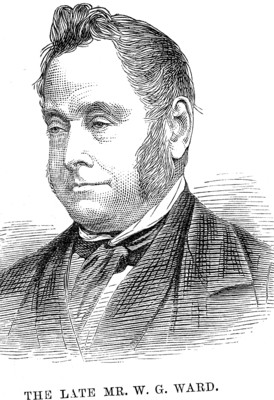
This gentleman, formerly in the orders of the Church of England and a distinguished member of the University of Oxford, but for some thirty-five years past a lay member of the Roman Catholic Church, died at Hampstead three weeks ago, at the age of seventy. He was son of Mr. William Ward, a Director of the Bank of England and M.P. for the City of London, and was educated at Winchester School, and at Christ Church College and Lincoln College, Oxford. He gained high honours at the University, and became a Fellow of Balliol College, and Mathematical Tutor. He was one of the most zealous and active members of the Tractarian High Church party, and in 1844 published a book entitled "The Ideal of a Christian Church," in which he compared the Church of England with the Church of Rome, expressing his belief that the Church of Rome was in the right, and that Protestants ought to "sue humbly at her feet for pardon and restoration." This volume provoked a storm of controversial denunciation almost as fierce as that which had been excited by "Tract 90 " of the " Oxford Tracts." It was formally censured and condemned by a vote of Convocation in February, 1845, and Mr. Ward was deprived of his Fellowship and Tutorship, and of the degree of Master of Arts. He did not, however, at once leave teaching, but married a daughter of the Rev. Prebendary Wingfield, and lived at Old Hall, near St. Edmund's College, Herts, where, having joined the Roman Catholic communion, he gave theological instruction to students of that faith, under the sanction of Cardinal Wiseman. In 1849, upon the death of an uncle, he came into possession of Northwood Park and Weston Manor, in the Isle of Wight. He continued, however, to devote himself to theological and philosophical studies, and in 1863 undertook the editorship of the Dublin Review which he conducted till 1878, supported by Cardinal Manning and other eminent persons of his Church. Several volumes of his articles and essays have been published. He was one of the founders of the Metaphysical Society, and had some passages of controversy with Mr. John Stuart Mill. He was, indeed, a man of varied accomplishments, a musical and dramatic critic, and bore a brilliant part in society and conversation.
Source: The Illustrated London News, No.2256—Vol. LXXXI, Saturday, July 29, 1882, p.122